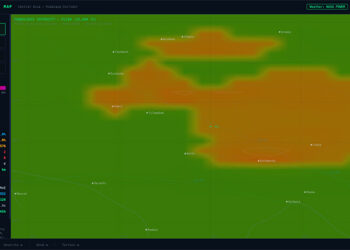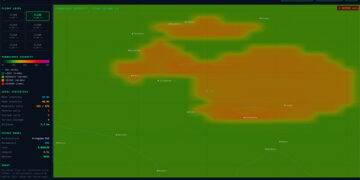Thinking about securing your home? The big question often comes down to this: DIY or professional security?
While DIY systems give you control and save some cash, professional setups offer peace of mind and expert support.
We’ll take a look at the pros and cons of both options to help you decide what’s best for your home.
Understanding Home Security Systems
A home security system does more than keep intruders out. It protects your property, alerts you to emergencies, and sometimes lowers insurance costs.
These systems usually include sensors, alarms, cameras, and monitoring services. Some homeowners prefer a local alarm vs a monitored alarm, while others want full-service protection.
The big question is: should you install your own system or leave it to the pros?
DIY Home Security Systems
DIY security systems put you in control. You choose the equipment, set it up, and decide how it operates.
Costs stay lower because you’re not paying for professional labor or ongoing monitoring fees. However, while DIY security systems save money upfront, they also come with extra responsibility. You handle everything, from installation to troubleshooting and repairs.
Popular options include wireless cameras, motion sensors, and smart locks. The best self-install home security system offers flexibility and affordability, but it’s not for everyone.
The Upside of DIY Security
- Lower cost – No installation fees, you only pay for the equipment.
- Flexibility – Add or remove devices whenever you want.
- Easy setup – Many DIY systems use wireless technology.
The Drawbacks of DIY Security
- No expert installation – If you install it wrong, your system won’t work properly.
- Limited support – If something breaks, you’re responsible for fixing it.
- Self-monitoring – You have to keep an eye on alerts yourself.
Professional Home Security Systems
A professional security system offers peace of mind that DIY setups struggle to match. Professional security system installation ensures that everything is set up correctly, so you don’t have to worry about faulty sensors or weak camera angles.
You also get round-the-clock monitoring, meaning trained professionals immediately respond to break-ins, fires, or medical emergencies.
These systems often include better-quality equipment and advanced features, like remote access, facial recognition, or integration with emergency responders.
They also tend to be more reliable, thanks to battery backups and cellular connections that work even if the power or Wi-Fi goes out.
Why People Choose Professional Security
- Expert setup – Professionals know the best locations for cameras and sensors.
- 24/7 monitoring – Someone always has eyes on your home.
- Stronger deterrent – Often include loud alarms and direct connections to emergency services.
- Reliability – Pro setups tend to have fewer false alarms and stronger security.
Where Professional Security Falls Short
- Higher cost – Installation fees and monthly monitoring add up.
- Contracts – Some companies tie you into a long-term commitment.
Effectiveness and Reliability
A security system is only as good as its response time. Professional monitoring means faster emergency response, but a well-maintained DIY system can still be effective.
False alarms are another factor. Poorly placed sensors or user error can lead to unnecessary alerts. Professional setups often include backup power and cellular connections, keeping them running even if your internet goes down.
Scalability and Integration
DIY systems are great if you want to start small and expand. You can add more cameras, motion detectors, or smart locks over time. Many integrate with smart home devices like Alexa or Google Home.
Professional setups tend to include more advanced technology, like glass-break sensors, environmental monitoring (for smoke and carbon monoxide), and direct emergency response integration.
DIY systems are improving, but you often need to purchase add-ons separately.
User Experience and Support
DIY systems rely on apps and online guides. Some brands offer customer support, but you handle troubleshooting yourself.
Professional systems include installation, support, and ongoing maintenance. If you’re comfortable troubleshooting tech, DIY is manageable. If you prefer hands-off security, professional support is worth considering.
A DIY system is great for renters, tech-savvy homeowners, and budget-conscious buyers who want control. But if you want a fully monitored, high-end security solution with zero hassle, professional installation is the way to go.
Legal and Insurance Considerations
A monitored system may lower your home insurance rates. Some insurers offer discounts for professionally monitored alarms.
Local laws may also impact your decision. Some cities require alarm permits, and false alarm fees can add up. Check your local regulations before choosing between a local alarm vs a monitored alarm setup.
Cost Comparison: DIY vs Professional Security
A DIY system can cost anywhere from $100 to $600 upfront, depending on the brand and number of devices. If you add professional monitoring, expect to pay around $10–$30 per month.
Professional security systems often involve installation fees ($99–$500) and monthly monitoring costs ranging from $20 to $60. Long-term contracts are common and there are sometimes cancellation fees if you opt out early.
Frequently Asked Questions
What’s the best self-install home security system?
The best self-install home security system depends on your needs. Many companies offer reliable, user-friendly setups with no long-term contracts. Look for systems with mobile alerts, easy integration, and flexible monitoring options.
How does DIY home security monitoring work?
DIY home security monitoring means you handle alerts yourself. Your system sends notifications to your phone when motion is detected, and you decide how to respond.
Are DIY surveillance systems effective?
DIY surveillance systems work well if installed correctly. Wireless cameras, motion sensors, and smart locks can deter break-ins and provide real-time alerts.
Conclusion
When deciding between DIY or professional home security, it’s all about finding what works best for you.
DIY systems offer control and cost savings but come with the responsibility of installation and troubleshooting. On the other hand, professional setups provide expert installation, continuous monitoring, and reliability, with a higher price tag to match.
While DIY is great for flexibility and scalability, professional systems are ideal for those seeking peace of mind without the hassle.
Ultimately, your choice will depend on your budget, technical comfort level, and the type of protection you want for your home.






























